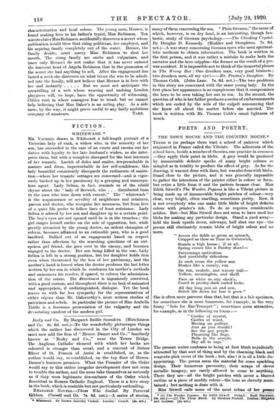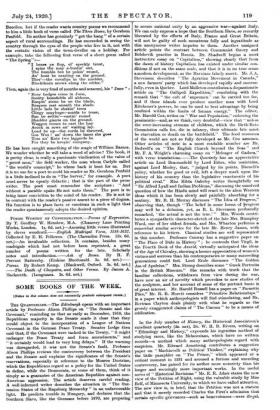POETS AND POETRY.
THE TOWN MOUSE AND THE COUNTRY MOUSE.* THERE is (or perhaps there was) a school of painters which originated in France called the Vibrists. The adherents of the school have, beside a number of theories, one practice in common —they apply their paint in blobs. A grey would be produced by innumerable definite specks of many bright colours so mingled as in- totality to produce the effect of grey. As for the drawing, it was not done with lines, but was also done with blobs. Stand close to the picture, and it was generally impossible to gather the intentions of the painter either in colour or form, but retire a little from it and the pattern became clear. Miss Edith Sitwell's The Wooden Pegasus is like a Vibrist picture in being made up of innumerable bright patches of colour—very clear, very bright, often startling, sometimes pretty. Now, it is not everybody who can make little blobs of bright definite colour with printer's ink. To do so requires considerable artifice. But—but Miss Sitwell does not seem to have used her blobs for making any particular design. Stand a yard away— hold the book upside down, sideways, half shut one eye—the poems still obstinately remain blobs of bright colour and no
more. "Across the fields as green as spinach, Cropped as close as Time to Greenwich, Stands a high house ; if at all, Spring comes like a Paisley shawl- Patternings meticulous And youthfully ridiculous.
In each room the yellow sun Shakes like a canary, run On run, roulade, and watery trill—. Yellow, meaningless, and shrill.
Face as white as any clock's, Cased in parsley-dark curled locks, All day long you sit and sew, Stitch life down for fear it grow."
She is often more perverse than that, but that is a fair specimen, for sometimes she is more humorous, for example, in the very funny "Solo for Ear-Trumpet " ; sometimes more attractive, for example, as in the following on trams :— "Castles of crystal, Castles of wood, Moving on pulleys Just as you should ! See the gay people Flaunting like flags, Bells in the steeple, Sky all in rags."
The present writer confesses to being at first blush unjudicially attracted by that sort of thing and by the charming black and magenta-pink cover of the book ; but, alas ! it is all a little dis- appointing. The poems seem the material for some sparkling design. Their humorous perversity, their scraps of clever metallic imagery, are rarely . allowed to come to anything. There they are—all the bright patches with never a blurred outline or a piece of muddy colour—the tone so cleverly main- tained ; but nothing is done with it.
Miss Sitwell calls some of the most urban of her poems
• (1) The Wooden Pegasus. By Edith Sitwell. Oxford : Basil Blackwell. [0e. net.]—(2) The Three Hoer,. By Gershora Penfold. London : Mod& and Jackson. Ps. net.J Bucolies, but if the reader wants country poems we recommend to him a little book of verse called The Three Hoers, by Gershom
Penfold. Its author has genuinely "got the hang" of a certain aspect of rural surroundings. He has succeeded in seeing the country through the eyes of the people who live in it, not with the ecstatic vision of the town-dweller on a holiday. For example, take the following first verse of a short poem called "The Spring " :— " I hears ye flop, ol' speekly trout,
I spies the may a-bustire out,
The bumble bee be pokin' round, An' heat be zazzling on the ground. Ther'—the cowslips in the medder,
Blackthorn snows along the edder."
Then, again (he is very fond of months and seasons), his " June " :
"Rosy hedges come in June, Scanty beanfields all abloom, Raspin' stone be on the blade, Reapers rest aneath the shade. Little lads be shakin' trees Clingy maybugs--maids to tease,
Sun be settin'--castin' round
Shadder giants on the ground. Waggon comes to cart the hay Acock in rows an' waiting lay. Load be up—the cords be throwed, Gee Wut ! an' down the lanes she goes Tom an' Kate two laggards be For they be keepin' company.
He has here caught something of the magic of William Barnes. We wonder whether he will take a word of advice ? The book, it is pretty clear, is really a passionate vindication of the value of " povre man," the field- worker, the man whom Carlyle called "the world's conscript," he whose back is bent for us. But it is no use for a poet to scold his reader as Mr. Gershom Penfold is a little inclined to do in "The Server," for example. A poet must never be openly didactic ; that is the part of the prose writer. The poet must remember the scripture "And without a parable spake. He not unto them." The poet is to bring inner conviction to the mind of his reader. He is not to be content with the reader's passive assent to a piece of dogma. His function is to place facts or emotions in such a light that the reader spontaneously adopts the desired opinion.



































 Previous page
Previous page